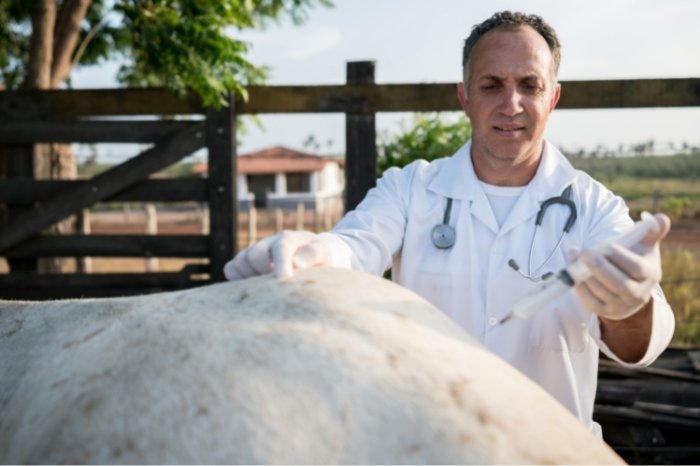Last Updated on May 13, 2022
No matter the species, the West Nile virus is a nasty thing to deal with. Knowing what treatment for West Nile virus in horses is available is important if you are a horse owner. It is vital you contact a veterinarian if you think your horse may have West Nile virus.
With the right treatment, most horses are able to make a full recovery from West Nile. Fortunately, there are also preventative measures you can take to prevent your horse from getting it. If you live in an area where West Nile rates are higher, it is important to know all the facts regarding this virus.
What Is West Nile Virus And How Does It Spread In Horses?
West Nile virus is a mosquito-borne virus that can affect humans and other animals. Horses make up 96.9% of non-human cases of West Nile virus reported.
Wild birds are considered natural hosts to the virus, as horses and humans can not give it to each other, making them dead-end hosts. The virus is transmitted to people and horses via mosquito bites.
Mosquito spread the virus after feeding on birds affected with West Nile. As the mosquito bites other animals, the virus then spreads through its infected bites. Horses are unable to spread the virus among other horses.
After a horse is bitten by an infected mosquito, the virus enters the bloodstream where it multiples. In most cases, horses will show no signs of the virus, but in some cases, they will develop neurological problems. If the West Nile virus crosses into the blood-brain barrier, it can cause inflammation of the brain and potentially death.
Check Out What Is The Best Type Of Goat For Horse Companion?
What Are The Symptoms Of West Nile In Horses?
In some cases, a horse may not exhibit any symptoms of the West Nile virus. However, common early-onset symptoms include twitching of the ears and muzzle, aggression, fine muscle twitching and chewing. Other symptoms include loss of coordination, weakness, elevated temperature, loss of orientation and increased excitability.
Though uncommon, in the most serious cases horses may have seizures, paralysis of the limbs, collapsing, coma and death. Horses will generally become ill from an infected mosquito 3-14 days after getting bit.
How Is West Nile Virus Diagnosed In Horses?
The symptoms of West Nile in horses are not exclusive to just the virus. Other diseases to differentiate include encephalitis-producing viruses, protozoal encephalomyelitis (EPM), rabies wobbler syndrome, severe injury, poisoning, bacterial infection and liver disease.
To diagnose if a horse does have West Nile virus, a blood sample will need to be taken. The blood will then be tested for the presence of the virus or antibodies. An IgM capture enzyme-linked immunosorbent assay (ELISA) is the most accurate way to detect West Nile and it can take six days to two months after the infection to identify.
Bronco E Equine Fly Spray Plus Citronella Scent, 32 fl oz; Long Hair Breeds, 8.4 lbs
Treatment For West Nile Virus In Horses
There is no specific Treatment For West Nile Virus In Horses. Treatments vary by symptomatic and supportive care for the encephalitis and the neurological irregularities that the virus creates. Such care may include anti-inflammatory drugs and intravenous (IV) fluids.
In most cases, horses will make full recoveries from West Nile. Certain horses will experience long-term effects such as gait and behavioral abnormalities. Horses that experience more severe symptoms are less likely to make a full recovery.
Older horses are more likely to experience severe symptoms than younger horses. The fatality rate is around 33% in horses exhibiting clinical symptoms.
Read more about Dominant Horse Behavior Advice And Tips
Preventative Measures Against West Nile Virus
Fortunately, there are some preventative measures that you can take against the West Nile virus. Vaccines are able for horses as annual core prevention to protect horses from infected mosquitos. Talk to your veterinarian about getting your horse vaccinated if you live in an area with higher rates of West Nile virus.
In addition to the vaccine, there are also preventive measures you can take to control your mosquito population. Be sure to eliminate any standing water besides water troughs as that is where mosquitos lay their eggs. Water troughs should be dumped and refilled at least once a week during summer.

Be sure to clean any water and debris out of your gutters. Stocking ponds and troughs with fish such as goldfish or minnows to eat mosquito larvae. You can also use fly spray with mosquito protection and fly sheets and masks to protect your horse from bites.
Conclusion On Treatment For West Nile Virus In Horses
Though there is no specific Treatment For West Nile Virus In Horses, most horses are capable of making a full recovery. You can also prevent the virus by getting your horse a vaccine. In addition, you can use fly spray, fly mask, eliminate standing water, and clean water troughs weekly in summer.
Do you have any questions regarding treatment for the West Nile virus in horses? If so, please ask any questions regarding the symptoms, as well as preventing and treating the West Nile virus in horses.

